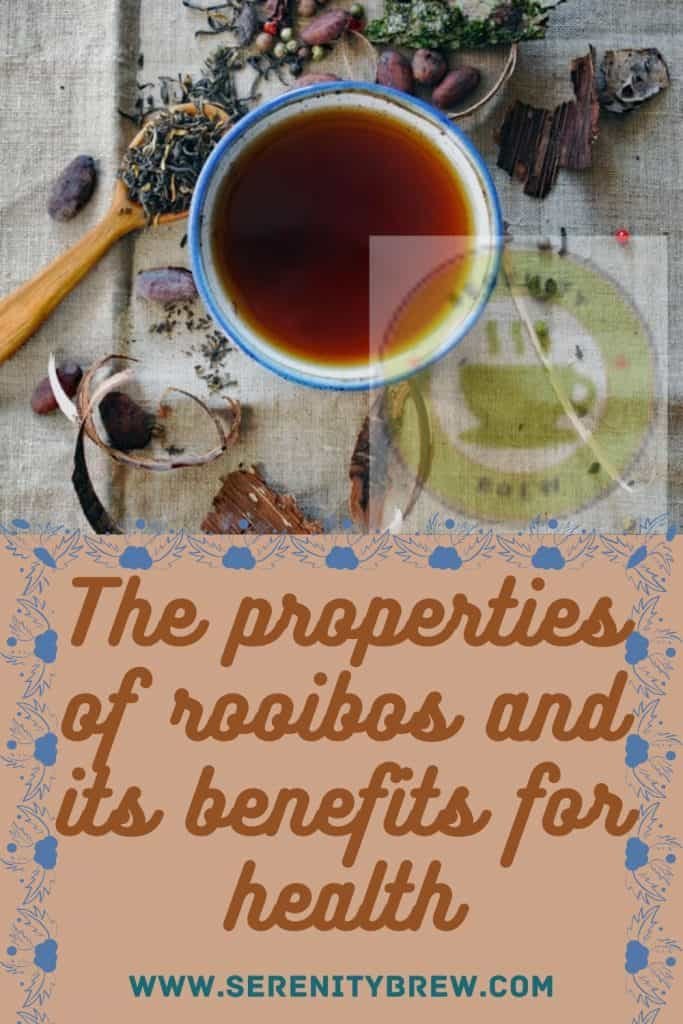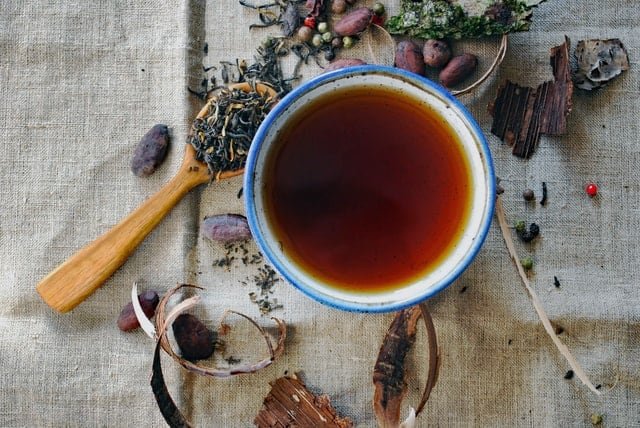
The health properties of rooibos began to attract the attention of the scientific community in the sixties, although its use in traditional medicine dates back much earlier.
Rooibos has been gaining a place among the favorites of infusion lovers who want to escape caffeine. Its zero content in it and its excellent flavor make it an excellent choice to drink at any time of the day, without having to worry about whether it will have us tossing and turning in bed.
However, the benefits of rooibos go further. In Japan, one of the places where it is consumed the most, rooibos is known as “the tea of long life” since it is considered a drink that slows down aging.
Rooibos is a great antioxidant thanks to its richness in polyphenols and aspalathin, an unusual substance and only found in rooibos. This composition makes its effects so powerful that it has been possible to measure increases in antioxidants in the blood after consumption.
What is rooibos
Crop
Rooibos is a shrub with elongated, needle-shaped leaves that thrives in the normally dry Cederberg and Sandveld mountains of South Africa.
“Rooibos” means red bush in Afrikaans and it is precisely the color that the leaves acquire once they dry.
Flavor: green or red rooibos?
Although not many people know it, rooibos is marketed in two varieties, green and red.
In the same way that happens with tea, the oxidation process that the leaves go through during its preparation influences the flavor of the result. Green rooibos does not go through the oxidation process, it dries immediately after harvesting. Its flavor is vegetable and reminiscent of green tea.
Red rooibos is the most common and is known simply as rooibos. During its elaboration process, the leaves oxidize and acquire their characteristic tone.
The flavor of red rooibos is soft, sweet and with hints of nuts. It is sometimes compared to hibiscus tea.
If you like rooibos and have only tried supermarket brands, we recommend you dare to get a slightly more select product. There can be a world of difference. We, who always prefer organic varieties, have chosen for our catalog a red rooibos and a green rooibos imported from South Africa. Both of superior quality and, of course, organically produced.
Composition and health effects
The health properties of rooibos have long drawn the attention of the scientific world. Rooibos contains minerals such as magnesium, zinc, manganese, iron, and calcium; it is also rich in vitamin C.
In addition, it is rich in polyphenols, organic chemical substances with a great antioxidant capacity. Rooibos polyphenols have anti-inflammatory, antiviral and anti-mutagenic properties. These phenolic compounds protect the body from free radicals that can cause cancer and heart disease.
The antioxidant power of aspalathin
Rooibos is the only known source of aspalathin, a substance that the plant produces as a protection mechanism and that has properties that have intrigued the scientific world. Many of the benefits of rooibos have to do with this peculiar element.
Aspalatin is a flavonoid with powerful antioxidant effects. So far, aspalathin’s properties have been identified to reduce excessive fat production, balance blood sugar, improve glucose uptake in muscle, and increase insulin secretion in the pancreas.
The antioxidants in rooibos are powerful enough to increase the levels of antioxidants detected in the blood after consumption. Thus enhancing the body’s defense systems against disease.
A drink without any caffeine…
If you are one of those who find it difficult to fall asleep, you can rest easy with rooibos: it contains exactly 0% caffeine. Caffeine is a chemical compound with exciting properties that we find in various plants. If we talk about the one found in tea, it can be called theine, although it is exactly the same compound.
Often, questions about whether or not rooibos has theine/caffeine come from the confusion between tea and infusion or tisane.
Teas are made from the leaves of the Camellia sinensis, while tisanes can come from many other plants. Rooibos, for example, is obtained from the South African red bush or Aspalathus linearis.
Camellia sinensis does have caffeine or theine, but Aspalathus linearis does not.
…and no calories
Rooibos is a healthy drink that you can use to supplement your diet. Rooibos has no additives or preservatives and, most interestingly, its caloric intake is practically zero.
If you fancy something tastier than water to accompany your meals, prepare yourself a rooibos.
Its flavor is delicious and you can take it hot or cold. An ice-cold rooibos is a great way to quench your thirst after a workout.
The taste of rooibos is sweet in itself, so, in addition, it is not necessary to sweeten it. This saves you from increasing the number of calories.
Can you take rooibos during pregnancy?
Rooibos has several properties that make it a good substitute for drinks such as tea or coffee during pregnancy.
For one thing, it’s caffeine-free. This is ideal, given that health authorities recommend limiting its consumption during pregnancy. High levels of caffeine can increase the risk that the baby will be born with less weight than she should or even have a miscarriage.
On the other hand, rooibos has a very low tannin content. Tannins have been linked to a reduced ability to absorb iron and thus lead to anemia, a common concern among pregnant women.
As always, and especially during pregnancy, things should be taken with measure. Specialists recommend not exceeding 3 cups of rooibos per day. If you want more information, it is best to consult your doctor.
Health benefits of rooibos
Properties of rooibos to prevent cancer
Free radicals are chemical compounds that develop during the normal metabolism of cells. Abnormally high concentrations of free radicals in the body can be caused by factors related to the environment such as tobacco, alcohol, the sun, pesticides, viruses, or even poor diet.
Free radicals can cause damage to cells, especially DNA, and may play a role in cancer and other ailments.
Antioxidants are chemical compounds capable of neutralizing free radicals.
Our body produces antioxidants naturally, the so-called endogenous antioxidants. However, it is necessary to supplement them with the intake of dietary antioxidants.
Rooibos is an excellent source of dietary antioxidants containing flavonoids such as dihydrochalcone glycoside, aspalathin, and notophagin. The complex mixture of polyphenols can help neutralize free radicals, preventing the damage they cause to the DNA of cells and, therefore, preventing their mutation in cancer cells.
Treatment and prevention of diabetes
The properties of rooibos have long been studied as a mechanism to improve insulin sensitivity, control blood pressure and reduce the risk of developing type 2 diabetes.
Numerous in vitro and animal studies have been carried out, some of which have obtained interesting results.
Aspalathin-enriched rooibos extract lowered blood glucose levels in diabetic rats. In a more recent study, this reduction in glucose levels was replicated in primates.
In this way, experts consider that aspalathin could have a role in helping to control blood sugar levels and improve glucose absorption and, therefore, help reduce the risk of developing type 2 diabetes and production excessive fat.
These results could lead to the development of diabetes treatments without some of the negative side effects of current drugs. The results began to be tested with humans.
On the other hand, in cases of diabetes, aspalathin helps balance blood sugar levels and improves glucose absorption by reducing cell insulin resistance. Both effects are beneficial to prevent spikes in sugar levels, an important factor in controlling the disease.
Anti-inflammatory properties of rooibos
Oxidative stress can induce inflammation. Rooibos contains aspalathin and notophagin, phenolic antioxidants whose anti-inflammatory properties have been studied in models of vascular inflammation and colitis.
Treatment of respiratory diseases
Chrysoeriol is a flavonoid present in rooibos that showed bronchodilator effects.
This would make it an aid to relieve symptoms caused by allergic rhinitis and asthma.
Against allergies
Rooibos contains another flavonoid that may help prevent allergies.
It’s called quercetin and it’s used in laboratories to stabilize mast cells, the cells involved in histamine release. This is the element that triggers allergic responses.
In this way, rooibos would work as a natural antihistamine. Of course, it would not be a replacement if you use any specific allergy treatment.
Restorative drink for athletes
Rooibos is a good substitute for commercial sports drinks; It is a good way to hydrate and replenish electrolytes after sport.
Rooibos contains magnesium, zinc, manganese, calcium, and antioxidant components. Calcium, magnesium and manganese are vitally important for bone health. In addition, its high concentration of magnesium and zinc help the production of testosterone, important for endurance and recovery capacity.
On the other hand, antioxidants improve blood circulation and reduce inflammation, both of which are important factors in helping to heal damaged muscle tissue. Aspalathin is also known to improve glucose absorption in the muscles.
Rooibos also helps the absorption of iron, which facilitates the supply of oxygen to the muscles.
Strengthens bones and teeth
Rooibos is a natural source of manganese, calcium, and fluoride; Beneficial minerals needed to maintain strong bones and teeth.
As you know, fluoride is a common ingredient in dental hygiene products and helps prevent cavities. Manganese also stimulates the enzymatic activity necessary to create and repair bones.
Enriching your diet with foods that contain these elements can help reduce the risk of osteoporosis, arthritis and other conditions related to bone and joint health.
Properties of rooibos to slow down skin aging
Rooibos offers benefits for the treatment of the skin and some skin problems such as acne.
It is rich in zinc and alpha hydroxy acids, chemical compounds widely known in the cosmetic industry and very rarely found in natural products. These are often used in products that help reduce wrinkles and prevent skin aging.
This study compared the effectiveness of various formulas based on natural compounds in reducing skin wrinkles. The compound based on rooibos and tea was the most effective for this purpose.
Improves cardiovascular health
Rooibos has anti-inflammatory properties. This study concluded that rooibos may have effects on cardiovascular health by inhibiting the angiotensin converting enzyme (ACE), which influences blood pressure. In this way, rooibos could be an aid to mitigate hypertension.
On the other hand, quercetin, an antioxidant present in rooibos, is related to the inhibition of LDL cholesterol.
Relief for the digestive system
Rooibos is a natural antispasmodic. According to this study, some of its compounds would help relax the digestive system and mitigate discomfort.
Adverse effects of rooibos
To date, there are no known adverse effects of rooibos. Some toxicology reports suggest that prolonged use at high doses could affect kidney and liver function, but there are few case reports.
There is no confirmed information on its effects during lactation and pregnancy. However, in Japan, where rooibos is very popular, popular culture considers its consumption during pregnancy to be beneficial.
Take advantage of the healthy properties of rooibos

Did you drink rooibos to escape the caffeine in your tea or coffee? Now you have a few more reasons to change your usual infusions for a rooibos more than once in a while.
